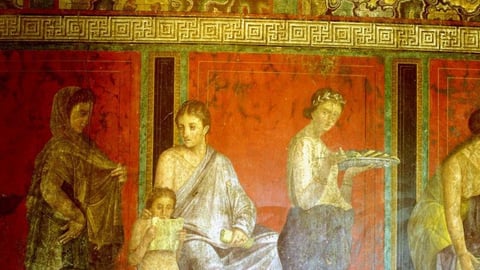Remember Pompeii
Aug. 24 in Pompeii was a day that began like any other but ended in disaster. Though I knew the story, I wasn’t quite prepared for its full impact.

My husband and I are both interested in history, so when a special exhibit of the ancient Roman city of Pompeii arrived at our local history museum, we planned an afternoon to take in a self-guided tour.
A thriving city
Displays of Pompeiian artifacts evoked a startlingly familiar and modern lifestyle. The port city was a cultural trading center, for example, so commerce thrived. Merchandise ranged from the latest technology to fast food, rather common sights in a modern urban center.
Again, comparable to a modern city, Pompeiian artisans set up shops along the main business thoroughfare, selling their wares such as pottery, jewelry and art, among others.
One shop carried cooking utensils, gadgets and appliances essential for the modern Roman kitchen.
A sign posted at a residence portrayed yet another familiar sight: “CAVE CANEM” (“BEWARE OF DOG”). In high-traffic areas, graffiti on building facades and colonnades was also quite common. Like today, the subject matter of the graffiti varied from profanity, to complaints against the government and its leaders, to the ubiquitous love note—in this case, “Marcus loves Julia.”
Pompeii even housed laundry facilities comparable to our modern dry-cleaning service. The services of hairdressers who specialized in the popular practice of hair dyeing were also quite common.
In short, Pompeiians were much like us, living and thriving in a bustling culture.
The scene is set
But on the morning of Aug. 24, A.D. 79, the scenic seaside town encountered complete destruction. A simulated reenactment of the fateful day helped us modern individuals understand the disaster.
Pompeii appears on screen: From the rooftop view of a courtyard, we see multiple red-tiled roofs of homes and businesses stretching into the distance, with a stunning view of the noteworthy mountain. A rumbling is heard, and the ground shakes. Then silence. The rumbling begins again, this time much louder, and the shaking intensifies. A terra-cotta roof tile loosens and crashes to the ground.
Dogs are barking now throughout the city. A baby fusses. Then cries. Then screams. Many voices are now raised in panic. Shouting. Tiles continue to crash to the ground, and in the distance, a rising cloud emanates from the mountain.
Ash begins to fall on the city. It looks deceptively beautiful and gentle. More shaking. Suddenly the volcano spews a large column of ash straight up, and the sky is darkened. Lightning. Rocks launched from the volcano now hit rooftops and buildings. Structures collapse amid flames. There are no voices heard now.
Ash continues to blanket the city, falling much more heavily now. Ruins are the only remains of the once solid walls. In the distance a tsunami-like wave of hot ash rushes toward and envelopes the remaining rubble.
Those who didn’t escape the city in time were trapped. They died either by the effects of the earthquake or by inhaling the toxic gas and ash from Vesuvius. Their remains, hauntingly preserved under at least 10 feet of ash (40 feet in one nearby city), tell different stories of how they died: attempting to flee, hugging a loved one, in silent resolution.
What’s the takeaway?
It might seem odd to focus so strongly on the lives and deaths of people who lived so long ago. But Pompeii can still teach us a lesson today.
The simple truth is that, in addition to leading lives of bustling activity today, we share one more thing in common with those ancient Romans: Our lives can end abruptly as well. True, the cause might not be a volcano, but it could be the direct result of any natural disaster, a car accident, a medical tragedy, etc.
Such a thought may sound morbid. But I encourage you to mentally harness this thought for personal motivation. Knowing that our lives are finite and fragile should spur us to action. It should make us consider if we are the most complete Christian we can possibly be.
A thriving Christian
Multiple biblical authors touch on this same theme.
- James, the half-brother of Jesus, encourages action by asking us to “be doers of the word, and not hearers only” (James 1:22).
- John, the beloved apostle, asks us to “walk just as He [Christ] walked” (1 John 2:6).
- The author of Ecclesiastes, traditionally understood to be King Solomon, challenges us: “Whatever your hand finds to do, do it with your might” (Ecclesiastes 9:10). (To learn more about this verse, read “The Meaning of Ecclesiastes 9:10: “Whatever Your Hand Finds to Do.”)
- The scholarly apostle Paul encourages us to be prudent and to prioritize our time appropriately (Ephesians 5:15-16).
- Jesus Himself gives us many actions to follow in His Sermon on the Mount (Matthew 5-7).
The zealous apostle Peter conveys the point simply by asking us a rhetorical question, and I personally find it interesting after witnessing the Pompeii exhibit that Peter asks his question in the context of the earth being destroyed by heat, fire and noise. He asks, “Therefore, since all these things will be dissolved, what manner of persons ought you to be in holy conduct and godliness?” (2 Peter 3:11, emphasis added).
It’s a fine question on which to ruminate. As you reflect on those in Pompeii in A.D. 79, individuals very similar to us, remember the lives that so quickly ended and join me in asking: Considering how abruptly life can end, what kind of person should I be?
Find more about the purpose of your life in our “Life” section and about how to achieve that purpose in our “Change” section.
Date Posted: September 24, 2012

